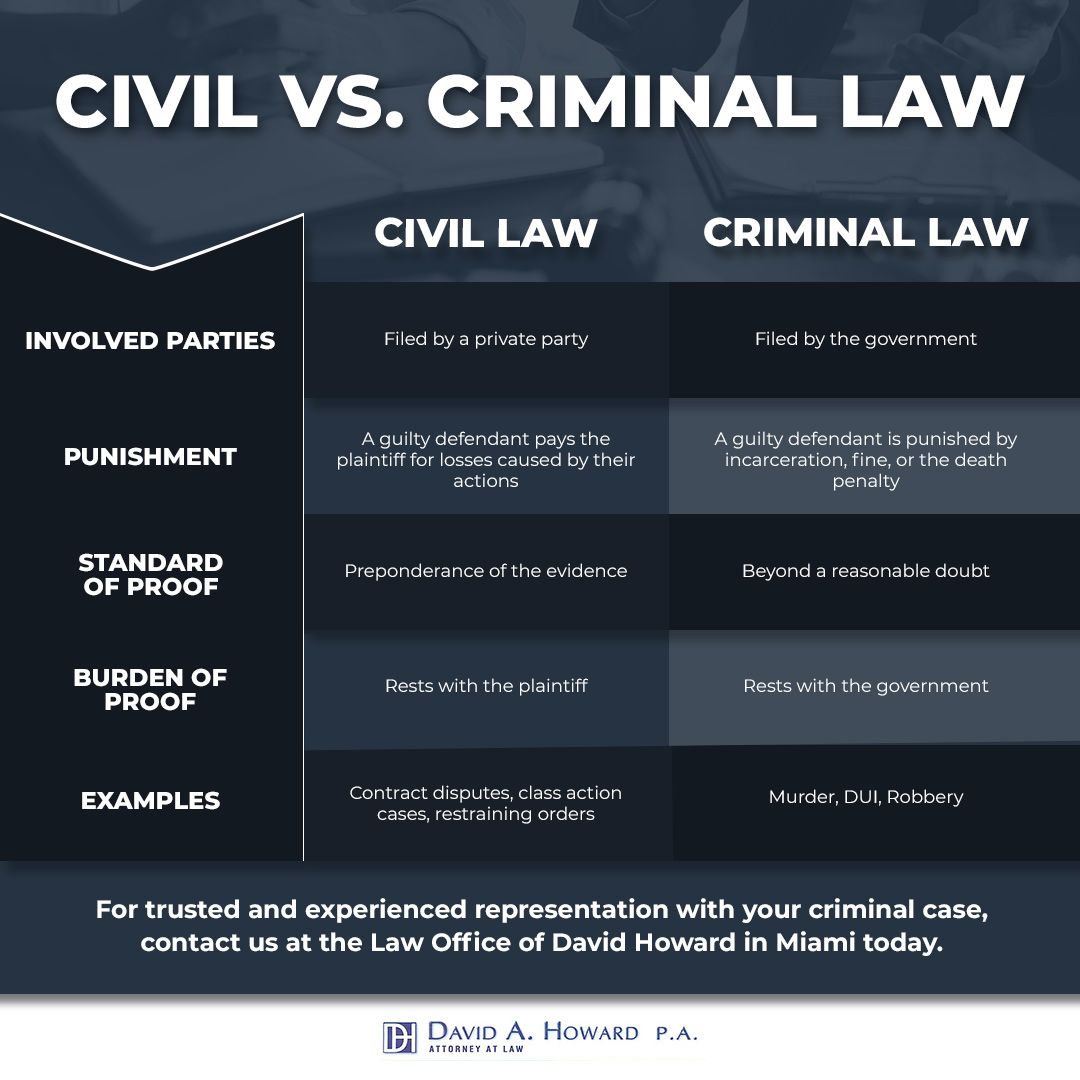
Criminal Vs. Civil Law: What’s the Difference?
When it comes to fields of law, you have likely heard of many different areas — family law, personal injury law, civil rights law, business law, and so on. In today’s post, we are going to be covering two areas of law that you may have heard about — civil law and criminal law — along with how they work and how they differ.
And, if you are in need of a criminal defense attorney in the Miami area, please don’t hesitate to reach out to us at the Law Office of David Howard today and get the representation and boldness you and your case deserves.

Criminal Law
First, we will briefly go over the basics of criminal law. Criminal law is a system of laws that are concerned with the punishment of individuals who commit crimes. Criminal prosecutions involve the government when it comes to deciding whether or not to punish an individual for an act or an omission of the law. Each state has its own way of deciding what conduct to designate a crime, and can vary significantly among themselves as well as the federal government.
Criminal defense attorneys help to fulfill many important roles throughout the duration of a criminal case, including defending a person who is charged with a crime and speaks on the client’s behalf. Without a trustworthy and reliable criminal defense attorney, the person accused of a crime risks punishment they may otherwise be able to avoid with a thorough understanding of the law and the judicial process.
Some examples of criminal law cases include:
- Assault
- Murder
- Money Laundering
- Robbery
- Drug Possession
- DUI/DWI
- Fraud
- White Collar Crimes
Civil Law
Civil Law, on the other hand, is derived from the laws of ancient Romans who used doctrines to develop a code that determined how legal issues would be solved. In the United States, civil law has a couple of different meanings, but it is basically the body of laws that govern ordinary private matters that are separate from political, military, or criminal matters. For the majority of the U.S., civil law is synonymous with “judge-made law,” or “common law,” which relied on past court decisions in order to determine the outcome of cases. Some examples of criminal law cases include:
Contract Disputes
Tort Claims
Complaints Against the City
Property Disputes
Class Action Cases
Criminal Vs. Civil Law
Both areas of law serve different purposes in the U.S. legal system. The case processes, type of punishment, burdens of proof, and how each system varies greatly between criminal and civil law.
Case Processes
With civil law, a case begins when a complaint has been filed by a party which could either be an individual person, a company or corporation, an organization, against another party. The complaining party is called the plaintiff and the party that is responding to the complaint is called the defendant. This process is called civil litigation, and in this process, the plaintiff asks the court to order the defendant to remedy a wrong, often in the form of monetary compensation to the plaintiff.
In criminal law, on the other hand, the case is filed by the government (usually referred to as the State) and represented by a prosecutor against a defendant. While an individual may report a crime, only the government is able to file criminal charges in court.
Type of Punishment
Another large difference between civil law and criminal law is the type of punishment. In criminal law, an individual who is found guilty is punished by incarceration. This could be by incarceration, a fine, or in some cases, the death penalty. With civil law cases, the losing party reimburses the plaintiff with punitive damage, which is the amount of loss that is determined by the judge.
Takeaway
As you can now see, criminal and civil law differ greatly — and we barely touched the surface. If you are interested in learning more about the differences between civil and criminal law or are in need of a criminal defense attorney in the Miami area, give us a call at The Law Office of David Howard today. We would be more than happy to assist you with your case and provide you with the relentless representation you deserve.

